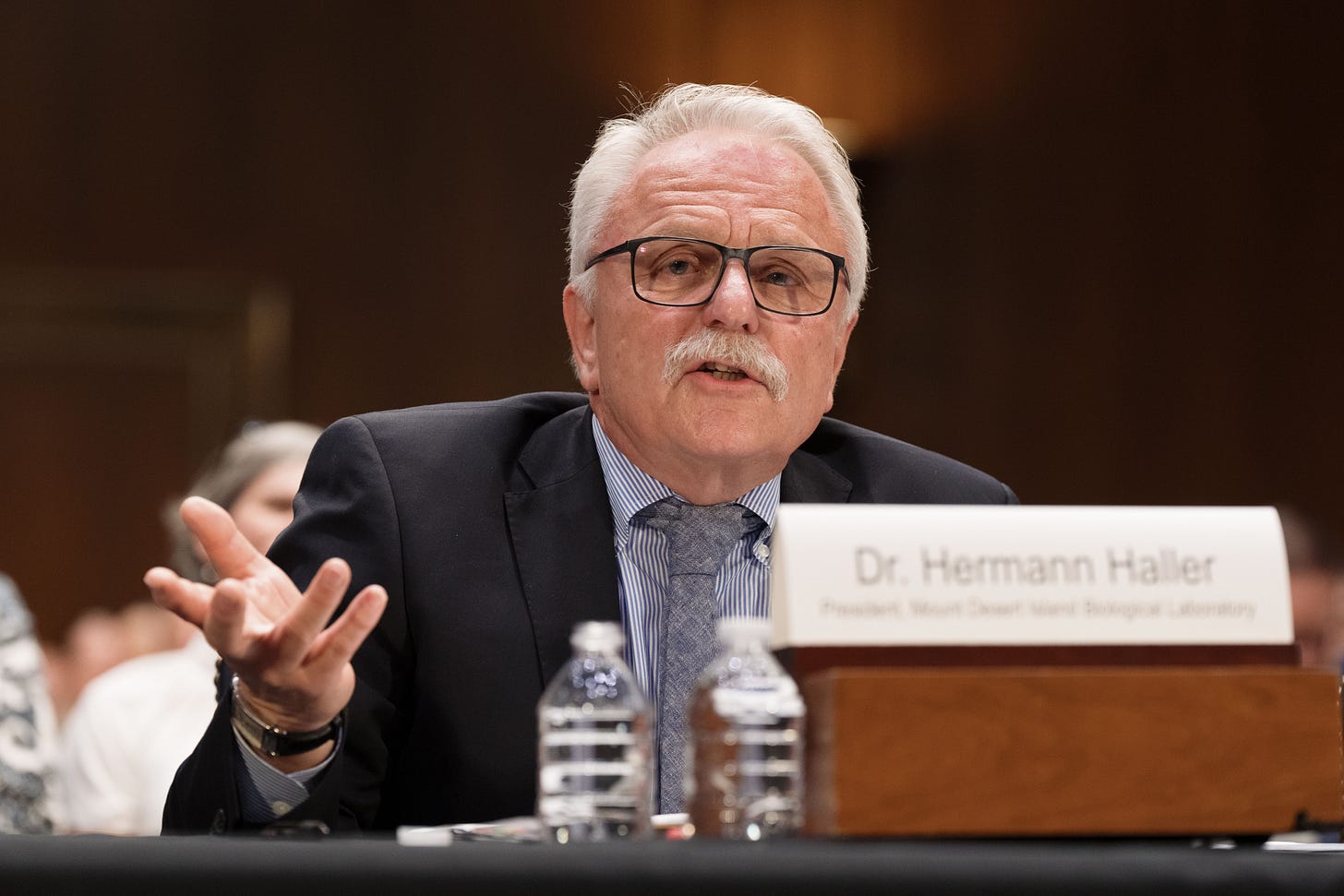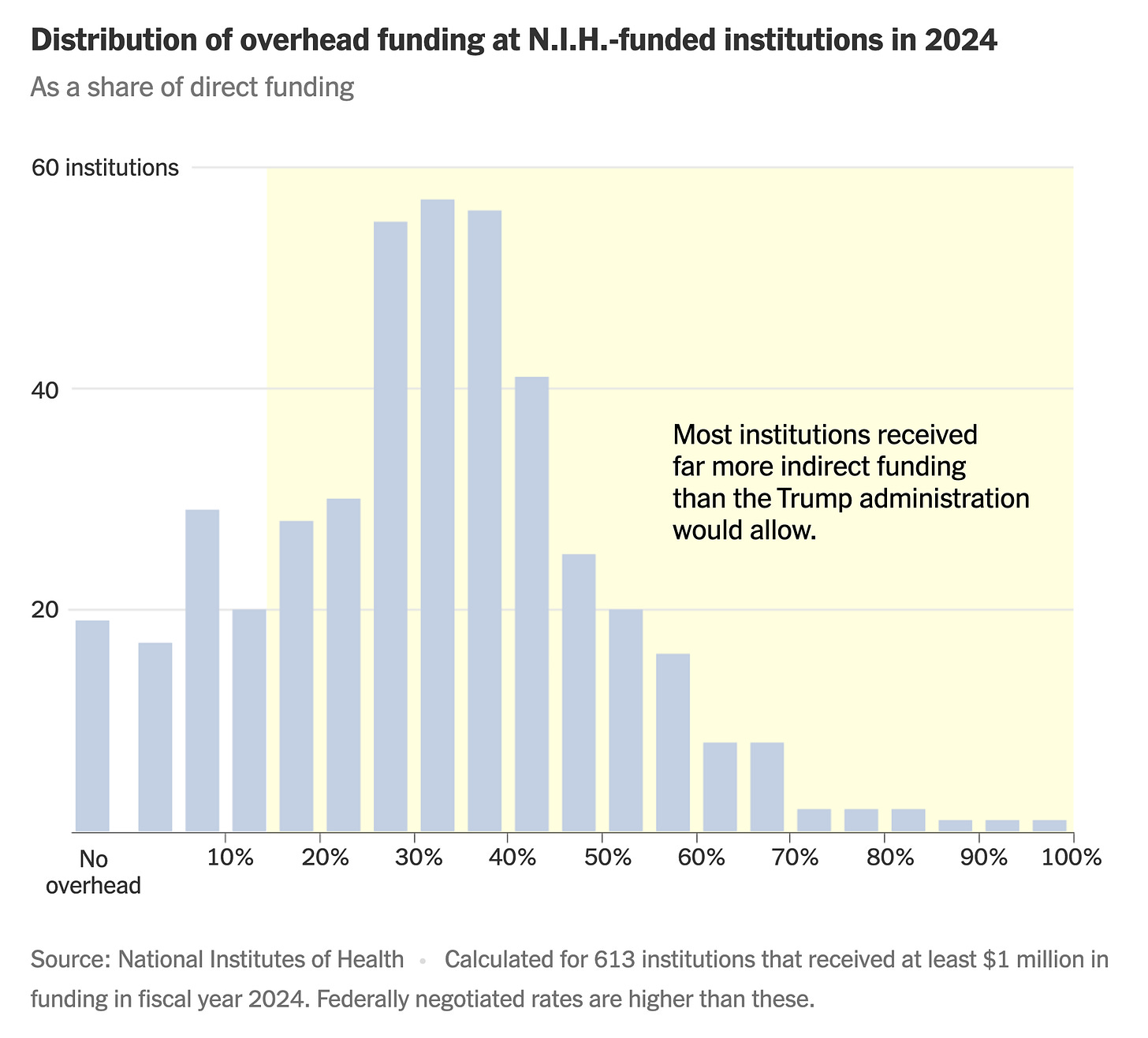‘We’ll Lose the Race’: U.S. Risks Surrendering Global Leadership in Biomedical Innovation
Experts Warn ‘The Lives We Save Tomorrow Depend on Today’s Decisions’
The Bar Harbor Story is generously sponsored by First National Wealth Management.
WASHINGTON, D.C.—“The lives we save tomorrow depend on the decisions we make today.”
That was the message MDI Biological Laboratory President Dr. Hermann Haller and others gave during their testimonies before Congress today, where Dr. Haller joined Senator Susan Collins (R-Maine) in calling for strong federal investment in biomedical research.
The stakes? Lifesaving discoveries, Maine jobs, and America’s global leadership in science.
Dr. Haller, M.D., president of Mount Desert Island Biological Laboratory was one of many who testified before Congress, Wednesday, stressing how important biomedical research is for the country. The hearing was led by Senator Collins.
Dr. Haller was invited to the April 30 hearing, titled “Biomedical Research: Keeping America’s Edge in Innovation”, by Senator Collins.
“Because of NIH investment, our laboratory has grown into an internationally respected research center with over 100 scientists and staff and a $20 million operating budget,” he said. “We now lead 17 Maine institutions that provide hands-on research experience to thousands of college students — almost all them continuing into science and medicine. That’s good for human health, good for the economy, and it grows the next generation of innovators.”
The early work on the national budget for fiscal 2026 has begun. That work includes funding for NIH and other federal research agencies.
“The lives we save tomorrow depend on the decisions we make today,” the scientist told the federal committee.
In Maine, NIH grants and contracts support 1,468 jobs and $286 million in economic activity, Senator Collins said.
“We should not lose sight of what is at stake. This debate is not just about scientists and researchers,” Senator Collins said. “If clinical trials are halted, research is stopped, and laboratories are closed, effective treatments and cures for diseases like Alzheimer’s, type I diabetes, childhood cancers, and Duchenne’s muscular dystrophy will be delayed or not discovered at all.”
According to Senator Collins, proposed funding cuts including firing some federal scientists and “policy uncertainties threaten to destabilize our system and to cause the United States to lose its global leadership.”
The 15% across-the-board indirect cost cap on NIH grants that occurred in February and caps on grants from multiple federal agencies were decried by Collins and others as “one size fits all.”
“Also very troubling are the administration’s abrupt canceling of grants, proposals to slash federal funding, and laying off scientists and technical experts with little or no justification. These actions put our leadership in biomedical innovation at real risk and must be reversed,” Senator Collins said.
In his testimony, Dr. Haller agreed.
“To understand what the cap means, we have to look at the funding system. Very briefly, you know all that, that you apply for a grant, and the grants are highly competitive, and they are given on the basis of scientific excellence. But before a scientist can start doing this research and using the grant money, they have to be provided with lab space, sophisticated laboratory space, with the services and the supplies needed to be able to carry out the research,” he began.
It has large implications for institutions like the MDI Biological Laboratory.
“Independent research institutions like mine, without a large endowment and without revenues from tuition, we are dependent on the present system of indirect cost reimbursement,” Dr. Haller said.
He and others during the testimony said there is always room for conversations, for questions, and for improvements.
“But the proposed 15 percent cap endangers our work and the work of all the other independent research institutions, and we will not be able to participate in what we have heard here, in life-saving research and biomedical breakthroughs,” he said.
Senator Lisa Murkowski (R-Alaska) asked how cuts in research funding might impact the discovery of treatments for diseases such as ALS.
Dr. Haller spoke of MDI Biological Laboratory investigator Emily Spaulding, Ph.D. of Maine.
Spaulding recently established her first research group at MDI Biological Laboratory, where she is uncovering the molecular mechanics of degenerative diseases such as ALS. It’s been seven months that Spaulding has waited for NIH to take action on the grant she applied for.
The award will keep her research going.
"She's driven by a desire to make contributions to understanding ALS," Dr. Haller said. "But at certain points of her career, she needs federal support, she needs this continuity. For young people ... this message of uncertainty is deleterious."
WHAT ARE INDIRECT COSTS?
When an institution such as MDI Biological Laboratory or Jackson Laboratory asks a granting agency for research support, it asks the granting agency for funds to cover “direct costs” to pay for the experiment or study, and “indirect costs” to reimburse the applicant institution for overhead (lab space, maintenance costs, HR costs, utilities costs, etc.).
Each applicant institution has a negotiated indirect cost rate (ICR) that the granting agency allows the applicant agency to include in its grant request.
The indirect cost rate is expressed in percentage terms. For example, if an institution’s ICR is 47.5%, when it asks for $100,000 to conduct a research experiment, it can add $47,500 to the direct cost request.
Research institutions depend on indirect cost recovery to maintain up-to-date infrastructure and the services necessary to propose and conduct research.
The Senate Appropriations Committee’s first full hearing in the 119th Congress today focused on “Biomedical Research: Keeping America’s Edge in Innovation,” a topic that resonates for the island’s Jackson Laboratory and MDI Biological Laboratory. Senator Collins was the chair.
“Proposed funding cuts, the firing of key federal scientists, and policy uncertainties threaten to destabilize our system and to cause the United States to lose its global leadership,” Senator Collins said.
Dr. Sudip Parikh, Ph.D., chief executive officer and executive publisher of Science for American Association for the Advancement of Science (AAAS) and Cartier Esham, Ph.D., the executive director of Alliance for a Stronger Food and Drug Administration joined Dr. Haller in testimony.
“This committee has been champions on behalf of biomedical research for as long as I can remember,” Dr. Parikh said, adding that this championship creates miracles in a scientific research and economic ecosystem that allows those miracles to happen.
“I have watched you all lead,” Dr. Parikh told the committee members.
Possible impoundment or recision of FY2025 funds worries him. That could happen if the funds aren’t utilized by the end of the fiscal year. Potential catastrophic cuts in FY2026 of possibly up to 40% also worries him.
”We’re no longer in a biomedical race with China,” he said if those cuts happen. “We will have lost that race.”
“That we chose this topic for our first full committee hearing of the new Congress speaks to the high priority this committee places on biomedical research. There is no investment that pays greater dividends to American families than our investment in biomedical research, which can lead to life-saving and life-enhancing discoveries,” said Senator Collins.
That commitment, Senator Collins said, has been a success. It’s been a success on an individual level, particularly for family’s like Emily Stenson, whose daughter Charlie is now cancer free. That is because of the research funding that occurs in the country.
According to a GoFundMe for Charlie, “Charlie has had tummy and digestive issues for some time now and has been seen quite a few times to try and find the cause. There has never been a clear diagnosis, that is until yesterday. After having a fever for a few days and not acting like herself, Emily and Derek (Charlie’s parents) decided to trust their gut and take her to the ER in hopes to find some answers. After multiple tests, scans, and hospitals, they finally received the devastating news that Charlie has stage-4 cancer. She has a tumor that is about five inches in her abdomen and the cancer has spread to her liver.”
Medical advancement and research is working on isolating the issue that keeps cancer from being detected in blood tests for approximately 10% of patients like Charlie.
“It feels like the government doesn’t care about families like ours if they take that (funding) away,” Stetson said.
“We’ve got to be the protagonists of our own story,” Dr. Parikh said. “It took generations to build it. It will take generations to rebuild it.”
During the discussion Senator John Kennedy (R-Louisiana) referenced a scandal that occurred throughout the 1980s, Stanford University, that was explained in a Time article as routinely “overcharging taxpayers for millions of dollars in research-related expenses.”
Dr. Parikh said that he was a teen during the events and the 1991 revelation, which occurred approximately four decades ago. He added that he encouraged discussions and questions about research and funding.
“The aim of this hearing is to draw focus to the success of the U.S. system and what must be done to preserve and strengthen it. We simply cannot allow America’s leadership to be lost,” Senator Collins said.
To understand what the cap means, people have to look at the funding system, Dr. Haller said. Highly competitive grants are applied for and given on the basis of scientific excellence, he said, but to do that work, scientists need lab space, services. Those are considered indirect costs.
“We are dependent on the present system of indirect costs reimbursement,” Dr. Haller stressed and the proposed cap endangers the MDIBL’s work and that of other independent institutions and would make it so those institutions couldn’t make lifesaving discoveries and research.
A HISTORY OF SUCCESS AND INNOVATION
“For nearly a century, the United States has led the world in biomedical innovation, thanks to far-sighted federal investments — in gifted thinkers, bold ideas, and the infrastructure that allows science to thrive," Dr. Haller said. "That commitment has made the U.S. an irresistible magnet for researchers like me, who seek out the best resources, colleagues, and students."
Senator Collins similarly lauded the country’s role.
“For more than 75 years, the United States has been the world leader in scientific research and technological innovation. We earned this position through the hard-work of countless thousands of scientists and their staff, many of whom trusted their careers to the culture of science built by the American people. At the heart of that culture is a strategy coordinating grant-based research at university and private labs funded through the National Science Foundation, the National Institutes of Health, the Department of Defense, the Department of Energy, and many other federal agencies,” Senator Collins said.
She qualified that strategy as an “enormous success,” and said a key to that success was stability of the program, which has allowed the scientists to focus on science rather than on searching for funding.
“This combination has made the U.S. an ‘irresistible magnet for researchers everywhere’—as Dr. Haller, one of our witnesses, puts it so well—drawing the best and the brightest from around the world. Their work demonstrates the value of the American system through biomedical breakthroughs leading to lives saved and health restored for so many,” Senator Collins said.
Collins cited the FDA’s approval of 200 new cancer treatments in the last 20 years, American scientists publishing 70% of all top-cited journals, a majority of the world’s biomedical patents, and more than half of the Nobel prizes in medicine.
Today’s hearing was the first of a two-part full committee hearing series titled, “Biomedical Research: Keeping America’s Edge in Innovation,” and featured researchers, stakeholder groups, and patient advocates to discuss the importance of U.S. biomedical research for the nation’s health and economy. A second hearing, which will occur on a later date, will include administration witnesses testifying on the federal government’s role in investing in and fostering biomedical innovation.
ABOUT DR. HALLER
Hermann Haller, M.D., became MDI Bio Lab’s president in 2018. An accomplished kidney specialist, he also is a full professor at the School of Nephrology at Germany’s Hannover Medical School. Haller is executing a bold new vision for growing MDI Bio Lab’s scientific capacity. In addition to pushing the boundaries of biomedical science, he holds a strong interest in the intersection of science and art.
LINKS TO LEARN MORE
To learn more about the MDI Biological Laboratory.
Q&A with Dr. Haller: Click HERE to watch and HERE to download.
Opening Statement: Click HERE to watch, HERE to download video, and HERE to download text.
Follow us on Facebook. And as a reminder, you can easily view all our past stories and press releases here.
If you’d like to donate to help support us, you can, but no pressure! Just click here (about how you can give) or here (a direct link), which is the same as the button below.
If you’d like to sponsor the Bar Harbor Story, you can! Learn more here.











